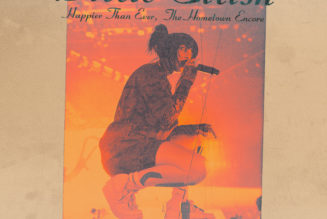
The Lowdown: Hayley Williams once said on the writing of Paramore’s Brand New Eyes album, “Some of it hurt, some of it was like, ‘Am I being too honest even with myself?’’’ Honesty has long been a trend with Williams’ approach to music-making; she’s been the principal songwriter for Paramore since 2005, and her scathing, dynamic vocals have granted her ever-evolving lyrics the perfect expression of painful, angry, at times heartbroken truth. On Petals for Armor, she dives inward at a new level, using dark pop melodies to not only vocalize her innermost thoughts, but also battle them, untangle them, and reckon with them in a way that feels personal to her own experience. She sings on the blistering “Watch Me While I Bloom”, “You only got one side of me/ Here’s something new/ I’m alive in spite of me/ And I’m on the move,” which feels like an apt precursor to an album that unfolds one piece at a time into a fresh look at the many sides of Hayley Williams.
The Good: “Petals for armor” isn’t only an introductory image; it’s the entire driving theme of the album. Williams gets right to it in the industrial, magnetic “Simmer” with the line “Wrap yourself in petals for armor” and uses this song and the ones that follow it to dig into her personal notions of femininity, womanhood, individuality, and — another line in “Simmer” — “how to draw the line between wrath and mercy.” She does her utmost to bring flavor, scent, and texture into these songs, pairing the fresh, immaculate production style of Taylor York with seamless vocal layering and harmonies (including with boygenius on “Roses/Lotus/Violet/Iris”) and a unique approach to genre that treads the lines between rock, indie, and pop.
She links synths with robust backbeats on tracks like “Creepin’”, tense lyrics with restrained melodies on “Leave It Alone”. Her vocals are as agile as ever, slicing cleanly not only through different octaves but also different styles, from soft indie-pop harmonies to a few of the enraged shouts that drew the world to her voice to begin with, like on “Watch Me While I Bloom”. Her music videos find her exploring the woods — in “Simmer,” running naked through them and stumbling over shadowy groves of skeletons and, in “Leave It Alone”, wandering thoughtfully through shrouded fields and emerging from a gooey cocoon — and these songs carry a searching feeling to them, too. Their melodies are creatively unpredictable but also relentlessly catchy, despite often being more scaled-back than the type of alternative rock longtime fans might be used to from Paramore.
In these songs, Williams is definitely finding the strength in vulnerability, the armor offered by petals — but femininity doesn’t always have to be about the binary between vulnerability and strength; it’s also its own whole weird nexus of things, disparately defined by each individual experiencing it. Williams explores this web as it pertains to her — in the daunting want of the boiling “Sudden Desire” and snappy “Sugar on the Rim”, the haunting but beautiful orchestration of the home she finds in “Cinnamon”, and the slow-burning closeness of “My Friend”. She finds the ways in which the petals, flowers, and butterflies we so readily link with beauty and delicacy can also be overpowering, at times even gruesome — because, after all, flowers also hint at growth, and growth is painful.
The Bad: The album blends together so smoothly that it’s easy to lose track of the divisions between parts one, two, and three, and it almost leaves one wondering how much the segmenting of the album in this way added. Maybe the point, after all, wasn’t to add but to delineate the qualities that were already there. But listening to the whole album in a consecutive run, it still becomes easy for certain songs to blend together, like “Pure Love” and “Taken”, when they pull off similar (although striking) effects too closely back-to-back.
The Verdict: More than any other band member, Hayley Williams is the heart of Paramore — not only for her memorable performances as lead vocalist, but also as the only member featured on all five of their albums. But where Paramore often sounded like a voice backed by a whole generation of impulses, rage and ideas (i.e. “If there’s a future we want it now”), Williams sounds here like she’s singing about something else, something more her own. The assorted focuses of these songs sound like they’re being relayed less as rallying cries and more as personal thoughts and confessions to a close friend or a lover. The result is a fitting solo debut, a solid album full of friction and honesty.
Essential Tracks: “Simmer”, “Dead Horse”, and “Watch Me While I Bloom”









